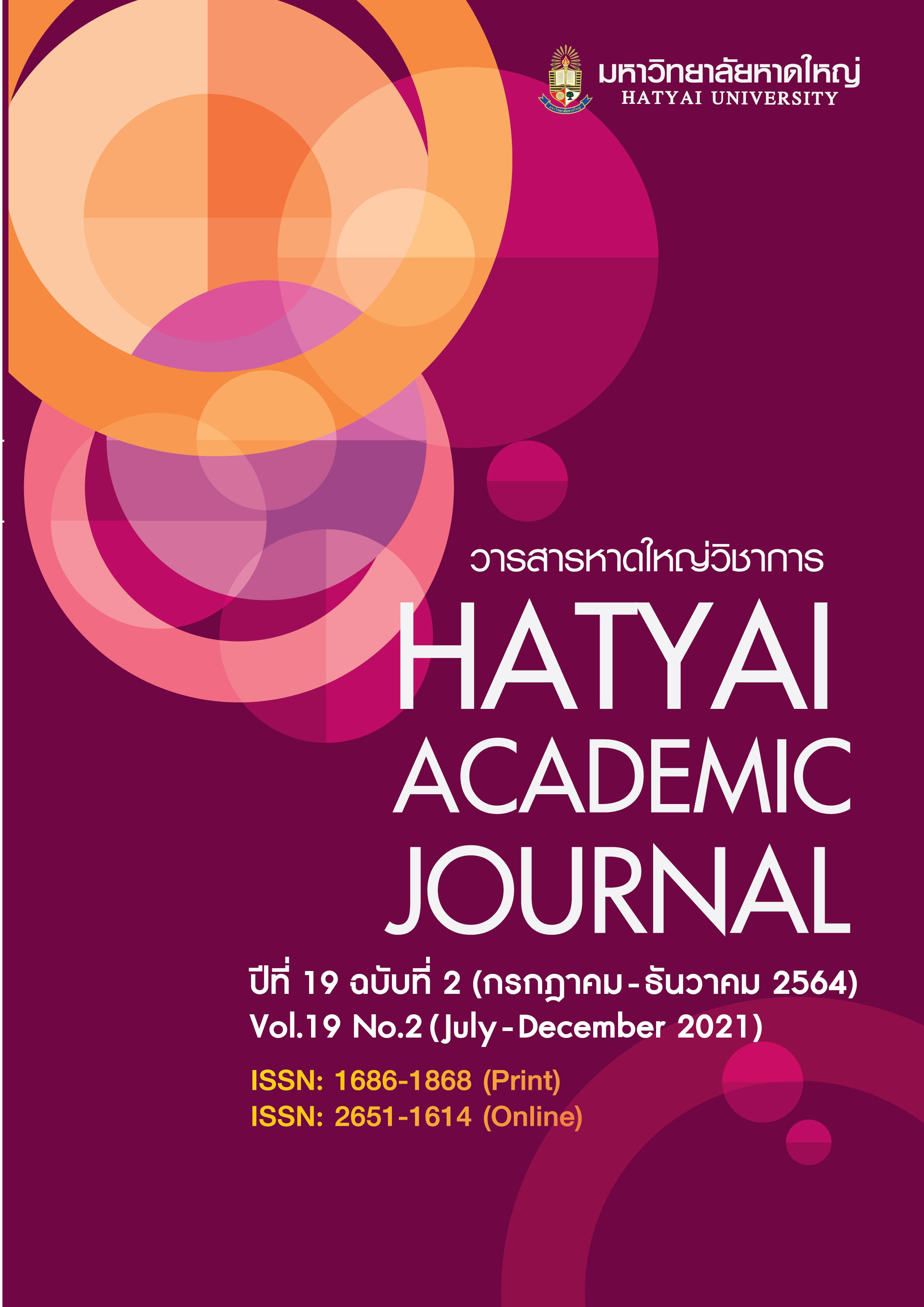Thai Tourists’ Satisfaction with Ecotourism and Adventure Destinations in Nopphitam District of Nakhon Si Thammarat
Main Article Content
Abstract
This research aims to study the satisfaction of Thai tourists with ecotourism and adventure in Nobpitam District, Nakhon Si Thammarat Province. The population and samples were 400 Thai tourists visiting the areas. Data collection was done using field surveys and questionnaires. The collected data was analyzed using descriptive statistics, which included frequency distribution, percentage, average, and standard deviation, as well as regulated standards for assessing the potential of tourist attractions.
The results of the study showed that the overall satisfaction of Thai tourists towards ecotourism and adventure destinations is between moderate and high levels. Tourists are the most satisfied with the service, followed by individual safety and property, news and events, convenience, and physical aspects of the destinations. The results of tourist attraction potential assessment analysis of six destinations such as rafting in Klong Klaii, Swan Cave, Khao Janglon Sea of Mist, Krung Ching Waterfall, Khao Leem Sea of Mist, and Pra Huey Laek forest path show that overall, the potential of the destinations meets the excellent standard. The highest-rated tourist attraction is Swan Cave, followed by Khao Leem Sea of Mist and Krung Ching Khao Janglon Sea of Mist, respectively.
Article Details
All published articles are evaluated by three qualified peer reviewers from various institutions through a double-blind process, where reviewers do not know the authors’ identities and authors do not know the reviewers’ identities. The content and articles in the Hatyai Academic Journal reflect the authors’ views only and are neither the opinions of the editorial board nor the responsibility of Hatyai University. The Editorial Board of the Hatyai Academic Journal allows articles to be reproduced for academic purposes, on the condition that the original source is clearly cited.
References
Black, R., & Crabtree, A. (2007). Quality control & certification in ecotourism. Wallingford: CAB International.
Boonprasom, N. (2016). A new dimension of tourism: Single lady travelers. Southeast Bangkok Journal, 2(2), 124-132. [in Thai]
Buckley, R. C. (2012). Sustainable tourism: Research & reality. Annals of Tourism Research, 39(2), 528-546.
Buckley, R., Zhong, L. S., Cater, C., & Chen, T. (2008). Shengtai luyou: Cross-cultural comparison in ecotourism. Annals of Tourism Research, 35(4), 945-968.
Choibamroong, T. (2008). Thailand international tourism year (2008). Bangkok: The Thailand Research Fund. [in Thai]
Dasee, P. (2014). Destination quality standard survey for Pang-Si-Da National Park, Srakaew province. Journal of International and Thai Tourism, 10(2), 14-31.
Dasri, P., & Kaewnuch, K. (2018). Exploring the quality standard of ecotourism destination in Pangsida National Park, Sa Kaew province. Journal of Thai Hospitality & Tourism, 13(1), 36-49. [in Thai]
D’Amato, L. G., & Krasny, M. E. (2011). Outdoor adventure education: Applying transformative learning theory to understanding instrumental learning & personal growth in environmental education. The Journal of Environmental Education, 42(4), 237-254.
Department of Tourism, Thailand. (2005). Guideline for quality standard of ecotourism destination assessment. Bangkok: Division of Attraction Development. [in Thai]
Donohoe, H. M., & Needham, R. D. (2006). Ecotourism: The evolving contemporary definition. Journal of Ecotourism, 5(3), 192-210.
Esichaikul, R., & Chansawang, R. (2017). Development of ecotourism attraction standards in Thailand. Dusit Thani College Journal, 11(Special Issue May 2017), 1-18.
Fennell, D. (1999). Ecotourism: An introduction. London: Routledge.
Jeenapak, V. (2012). Domestic tourists satisfaction towards the Erawan National Park in Kanchanaburi (Master’s thesis). Srinakharinwirot University, Bangkok. [in Thai]
Mihalic, T. (2006). Sustainable-responsible tourism discourse - towards ‘responsustable’ tourism. Journal of Cleaner Production, 111(1), 461-470.
Ministry of Tourism & Sport. (2020). Domestic tourism statistics Q1-Q4: Classify by region and province. Retrieved from https://www.mots.go.th/News-link.php?nid=11010 [in Thai]
Office of Permanent Secretary Ministry of Tourism & Sport. (2016). 12 Mueang not to miss plus. Retrieved from https://www.mots.go.th/ewt_dl_link.php?nid=8265 [in Thai]
Pongwiritthon, R., & Pakvipas, P. (2014). The guideline for development of strategies to raise the standards of natural attractions in Chiang Mai: A case study of Doi Inthanon National Park. Journal of Community Development Research, 7(1), 44-55. [in Thai]
Rattanapong, T. (2015). Effects of engagement and satisfaction are more inclined to come back repeatedly, the attractions in the province of Nakhon Si Thammarat (Master’s thesis). Prince of Songkla University, Songkhla. [in Thai]
Roiphila, V., & Chaiya, P. (2015). Tourism resources components affecting creative tourism in Kalasin. Journal of Humanities and Social Sciences Valaya Alongkorn, 10(3), 197-211. [in Thai]
Sharpley, R. (2006). Ecotourism: A consumption perspective. Journal of Ecotourism, 5(1), 7-22.
Spenceley, A. (2008). Impacts of wildlife tourism on rural livelihoods in southern Africa. In A. Spenceley (Ed.), Responsible tourism: Critical issues for conservation & development (pp.159-186). London: Earthscan.
Srisa-ard, B. (2002). Introduction to research (7th Ed). Bangkok: Suweeriyasarn. [in Thai]
Surawattananon, N. (2019). Tourism & the role of driving the Thai economy. Is a hero necessary? Real hero? Retrieved from https://www.bot.or.th/Thai/Research& Publications/articles/Pages/Article_29Oct2019.aspx [in Thai]
Tourism Authority of Thailand. (2012). Eco & adventure tourism. Bangkok: Tourism Authority of Thailand. [in Thai]
Vereczi, G. (2007). Sustainability indicators for ecotourism destinations & operations. In R. Black & A. Crabtree (Eds.), Quality assurance & certification in ecotourism (pp. 101-115). Wallingford: CAB International.
Weaver, D. B. (2005). Comprehensive & minimalist dimensions of ecotourism. Annals of Tourism Research, 32(2), 439-455.
Weaver, D. B. & Lawton, L. J. (2007). Twenty years on: The state of contemporary ecotourism research. Tourism Management, 28(5), 1168-1179.
Yamane, T. (1973). Statistics: An introductory analysis (3rd ed.). New York: Harper & Row Publications.
Yimmuk, I. (2016). Tourists’ expectation & actual experience perception towards ecotourism Kiriwong Village Nakhon Si Thammasat province (Master’s thesis). Chulalongkorn University, Bangkok. [in Thai]


